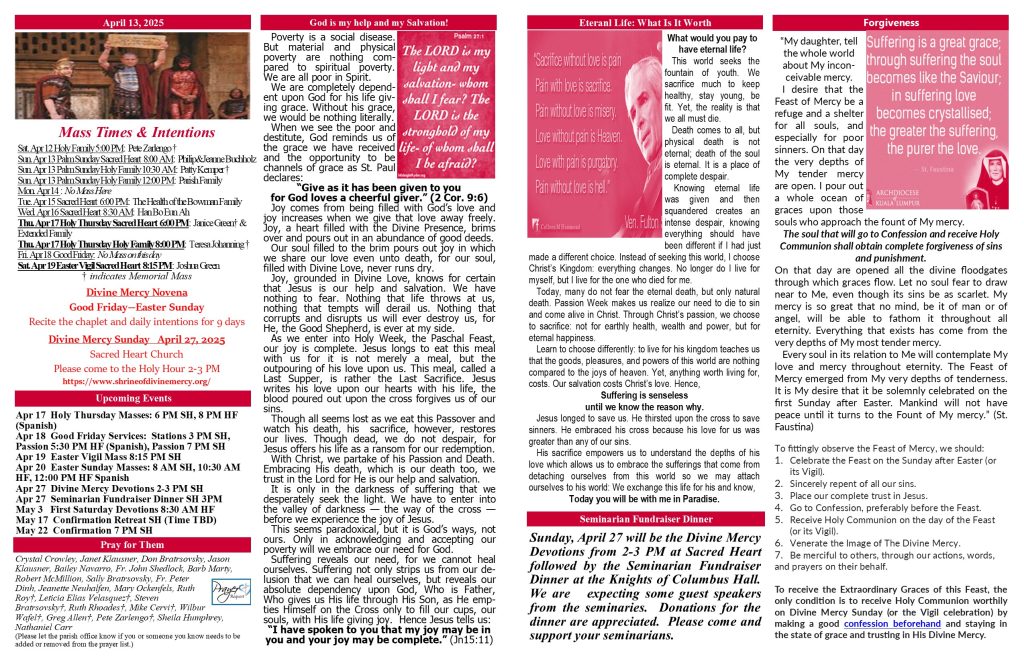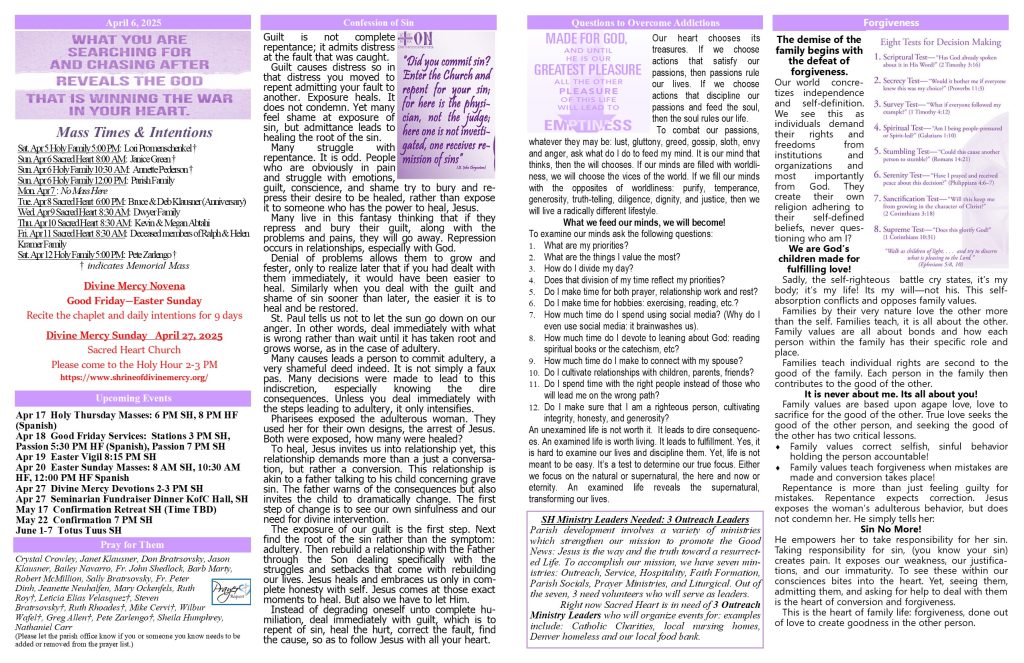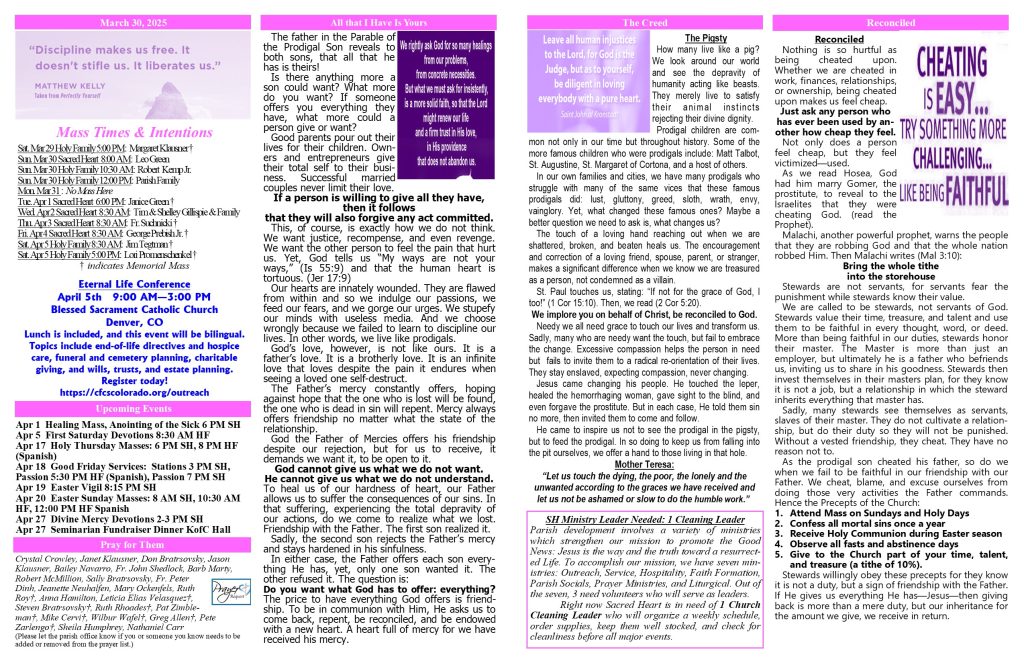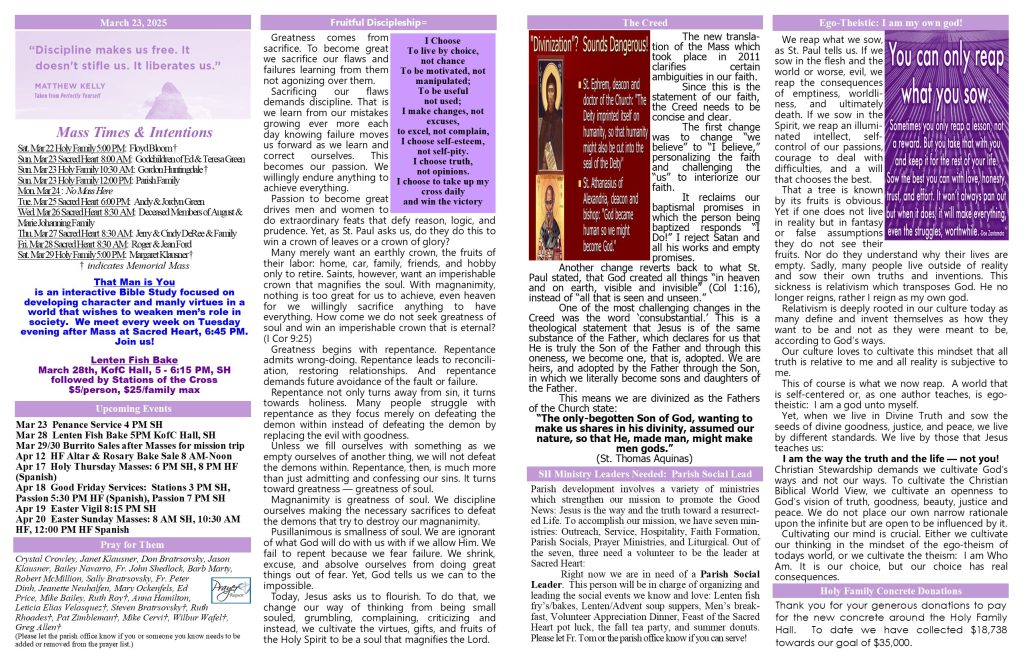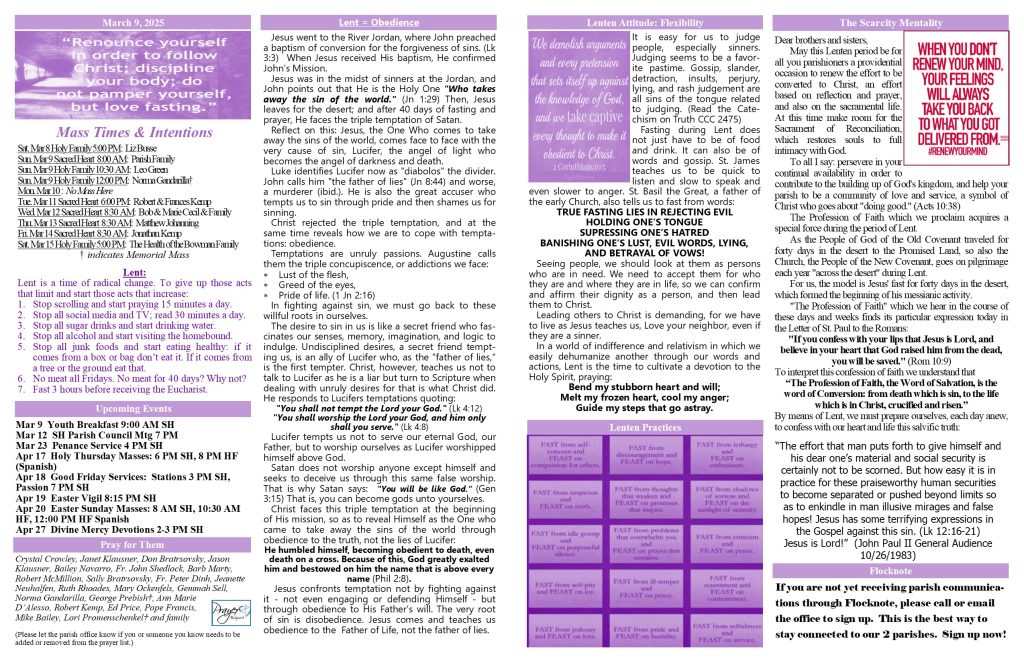Author: Christina Workman
Sorrowful Mother
“The Lamb who is in the center of the throne will shepherd them and lead them to springs of life-giving water, and God will wipe away every tear from their eyes” (Rev. 7:17)
Tears of sorrow cover the earth. Day after day, tears flow because of the pain, hurt, and guilt we endure on account of sin. It began with Adam and Eve but it ended with Mary as her tears flowed at the foot of the Cross. She, the Mother of All Sorrows, embraced the life of her Son fulfilling the prophecy of Simeon.
He foretold that a sword shall pierce her heart and so it did. Herod came to kill her Child and so she and Joseph fled into Egypt, a pagan land from which the Israelites left.
Mary also lost her Son in the Temple, a foretaste of when she would lose Him on the cross. Mary met her Son on the way to Golgotha. Jesus told her that He makes all things new, carrying the cross of death, crowned with thorns, and scourged beyond recognition, promising something new.
Then Mary receives Jesus’ lifeless body as they lower Him from the cross. She was not to touch Him as she too would be defiled, as He was, but she did. Mary watched as they wrapped his body in a clean linen cloth, covered his face with a separate cloth as was Jewish custom, all rushed as the Sabbath began.
These sorrows pierce our heart for we too endure each of these pains. We are told of great promises for our sons and daughters only to be crushed by reality and the evil of our world attacking them.
We flee from evil and run to safety only to find out that we lose our way and sometimes our loved ones too. We face the trials of life carrying our crosses and the crosses of those we love, thinking that all is lost. We face our own death and the death of others. The grief we endure to watch a loved one die, the fear we face when we too have been sentenced to death.
The violence and terrorism of this world is a taste of hell as we still see people tortured, enslaved, trafficked, and killed because of their faith. We also recognize we must die as we must bury our loved ones.
Though we endure our sorrows, we have hope, for just as Mary endured her sorrows, she believed and so do we.
We believe that death no longer stings; death has been swallowed up. Jesus has wiped away our tears with his resurrection! Yet, Mary at the foot of the cross suffered with Him and will suffer with us. Jesus entrusted us to her motherly care, knowing that through her faith, we find strength as we endure our sorrows, she interceding for us giving us hope.
Layers of Pain
For most, when we think of pain, we relate to bodily pain. And yes, it can be excruciating, a crucifixion.
Yet, other levels of pain exist. Talk to someone who is filled with fear, anxiety, doubt, and the like.
St. Thomas Aquinas, explaining our emotions, states we have 11 base emotions in two categories. The first is concupiscible and the second is irascible.
Concupiscible emotions are perceived as desirable with their opposite. The list of concupiscible are:
Love/Hate
Desire/Aversion
Pleasure (Joy)/Pain (Sorrow)
Irascible, meaning ‘in anger,’ are those emotions that refer to more difficult and challenging ones:
Hope/Despair
Fear/Daring
Anger (stands alone)
All other emotions are but fine shades of these primordial eleven as described.
Sadly, emotions are powerful and also painful. Worse, our culture gives primacy to emotions as principles for behavior. ‘How does it make you feel’ is the root, making emotions the basis for decision making.
We are taught to do the things that make us happy — emotionally. Many times what makes us happy for the moment actually leads to dysfunction and addiction. St. Thomas tells us Reason – the power of our intellect that rightly orders – should temper our emotions.
Reason, or our mind, is also a source of pain. The mind seeks goodness, justice, and truth, and when we see evils, injustices and betrayals by lies, it is a deeper level of pain.
We have heard of the injustices concerning human trafficking, slavery, political and even ecclesial cover-ups, and the horror of genocide. These cause excruciating mental pain, for we know we are strangled and suppressed, unable to justify and vindicate the truth.
Finally, we have spiritual pain. This is the deepest level of pain as seen in depression. A person’s life becomes dark: Judas suffered this! So did Peter. Yet Judas despaired, Peter hoped. Judas thought he killed God, Peter believed in God. Today many despair thinking God is dead. This is spiritual pain, and sadly is much taught and believed today. What is the answer to this spiritual pain? Trusting Divine Love as stated in Psalm 23:
The LORD is my shepherd; there is nothing I lack.
In green pastures he makes me lie down;
to still waters he leads me; he restores my soul.
Mercy My Mission!
To humanity, which sometimes seems bewildered and overwhelmed by the power of evil, selfishness and fear, the Risen Lord offers his love that pardons, reconciles and reopens hearts to hope. It is a love that converts hearts and gives peace.
How much the world needs to understand and accept Divine Mercy! It gives hope.
Living in a cruel world in which people freely condemn and curse others, we need peace.
Peace comes from the word Shalom. Shalom does not merely mean to be free of war or tension, but it harmonizes a person with God’s will: Thy will be done!
Shalom is harmony with God knowing that what you are doing and facing is God’s will — sometimes God’s cross — for you.
Shalom strengthens us to carry this cross knowing our strength comes from the Lord, not ourselves!
Those who try to carry their cross on their own will struggle, fight, and fail because they rely on worldly resolutions, personal efforts, and sometimes evil solutions.
Those who face their crosses in life trust in Divine Mercy. Divine Mercy is God’s love displayed. Mercy actively heals us! The mercy revealed last week with His death and resurrection, invites us to receive mercy through confession.
Confession, the sacrament that reconciles us with the Father, restores our dignity as it gives us courage to confess any and all sins. Sadly, our pride gets in the way of our relationship with Jesus and we fail to trust our shame to his mercy. We cannot fathom a God who forgives as well as heals, especially when we feel so unworthy. Yet, Jesus states:
“Abide in me, and I in you. As the branch cannot bear fruit by itself, unless it abides in the vine, neither can you, unless you abide in me. I am the vine, you are the branches. He who abides in me, and I in him, he it is that bears much fruit, for apart from me you can do nothing.” –John 15:4-5
Jesus desires to purify us! He desires to remove the darkness of sin from our lives! He desires that we bear fruit as He does, rising from the dead. To bear fruit He explains:
“Every branch that does bear fruit he prunes,
that it may bear more fruit.” (John 15:2)
This is what confession does. His Divine Mercy so unfathomable prunes us of sin, then restores our dignity revealing to us our infinite value as seen through the eyes of our Father. Do you believe this?
To confirm this over and over the Psalm reminds us: “His mercy endures forever.” Ps 118
Easter!
“This is the day the Lord has made; let us rejoice and be glad.” Ps 118:24
Jesus made it! He made it through the trial in the desert, through Calvary, and now reigns in heaven. We who are human will also make it if we believe and persevere.
Perseverance causes joy for we too walk the Calvary Road with Jesus.
Upon Calvary, Jesus died, but we who persevere in carrying our cross, will die too, only to rise with Him.
Holy week tests our faith! Easily we flee with his disciples and betray Jesus, as did Judas and Peter. During our trials, perseverance flees and we fail. Failure ensnares us in the darkness for we do not follow the Light through darkness.
On the day of despair when our sin crucified our Lord, we are faced with the same questions as the disciples: Can we trust Jesus?
The beautiful truth is that through this struggle and trial, God rises and appears to us! All we need is to have open eyes and hearts to see and trust.
Trust rejoices for we pass through the darkness of death and find life. His life is our life and his resurrection is ours too.
Today we rejoice for we trusted, despite our doubts that the Lord rises from the dead. His resurrection liberates us from sin and allows us to walk in newness of life, for we are a new creation, singing:
“I will praise you, Lord, for you have rescued me.”
God’s visitation surprises us. He always surprises us bringing good out of evil.
The women come to the tomb only to be completely surprised that the stone was rolled away. John and Peter run to the tomb and are surprised that it is empty and the linens are folded. Then the great surprise. Jesus appears showing his wounds and his side, declaring:
“Peace be with You!”
Surprised, we experience the unbelievable. Sin loses its hold as Jesus forgives and breaks the chains that enslave. Death is destroyed because Jesus rises from the dead. Our lives are restored and our trust in Jesus is renewed.
No greater witness exists than when a person fulfills his promises. Jesus promised He would rise from the dead and He did. Jesus promised to send his Holy Spirit giving us courage and confidence and He did. Jesus gives us confidence for his words are true. In his resurrection, our doubt has been destroyed, for Jesus creates hope that despite our sinfulness and fears of death, we too will rise if we persevere.
God is my help and my Salvation!
Poverty is a social disease. But material and physical poverty are nothing compared to spiritual poverty. We are all poor in Spirit.
We are completely dependent upon God for his life giving grace. Without his grace, we would be nothing literally.
When we see the poor and destitute, God reminds us of the grace we have received and the opportunity to be channels of grace as St. Paul declares:
“Give as it has been given to you
for God loves a cheerful giver.” (2 Cor. 9:6)
Joy comes from being filled with God’s love and joy increases when we give that love away freely. Joy, a heart filled with the Divine Presence, brims over and pours out in an abundance of good deeds.
Our soul filled to the brim pours out joy in which we share our love even unto death, for our soul, filled with Divine Love, never runs dry.
Joy, grounded in Divine Love, knows for certain that Jesus is our help and salvation. We have nothing to fear. Nothing that life throws at us, nothing that tempts will derail us. Nothing that corrupts and disrupts us will ever destroy us, for He, the Good Shepherd, is ever at my side.
As we enter into Holy Week, the Paschal Feast, our joy is complete. Jesus longs to eat this meal with us for it is not merely a meal, but the outpouring of his love upon us. This meal, called a Last Supper, is rather the Last Sacrifice. Jesus writes his love upon our hearts with his life, the blood poured out upon the cross forgives us of our sins.
Though all seems lost as we eat this Passover and watch his death, his sacrifice, however, restores our lives. Though dead, we do not despair, for Jesus offers his life as a ransom for our redemption.
With Christ, we partake of his Passion and Death. Embracing His death, which is our death too, we trust in the Lord for He is our help and salvation.
It is only in the darkness of suffering that we desperately seek the light. We have to enter into the valley of darkness — the way of the cross — before we experience the joy of Jesus.
This seems paradoxical, but it is God’s ways, not ours. Only in acknowledging and accepting our poverty will we embrace our need for God.
Suffering reveals our need, for we cannot heal ourselves. Suffering not only strips us from our delusion that we can heal ourselves, but reveals our absolute dependency upon God, Who is Father, Who gives us His life through His Son, as He empties Himself on the Cross only to fill our cups, our souls, with His life giving joy. Hence Jesus tells us:
“I have spoken to you that my joy may be in you and your joy may be complete.” (Jn15:11)
Confession of Sin
Guilt is not complete repentance; it admits distress at the fault that was caught.
Guilt causes distress so in that distress you moved to repent admitting your fault to another. Exposure heals. It does not condemn. Yet many feel shame at exposure of sin, but admittance leads to healing the root of the sin.
Many struggle with repentance. It is odd. People who are obviously in pain and struggle with emotions, guilt, conscience, and shame try to bury and repress their desire to be healed, rather than expose it to someone who has the power to heal, Jesus.
Many live in this fantasy thinking that if they repress and bury their guilt, along with the problems and pains, they will go away. Repression occurs in relationships, especially with God.
Denial of problems allows them to grow and fester, only to realize later that if you had dealt with them immediately, it would have been easier to heal. Similarly when you deal with the guilt and shame of sin sooner than later, the easier it is to heal and be restored.
St. Paul tells us not to let the sun go down on our anger. In other words, deal immediately with what is wrong rather than wait until it has taken root and grows worse, as in the case of adultery.
Many causes leads a person to commit adultery, a very shameful deed indeed. It is not simply a faux pas. Many decisions were made to lead to this indiscretion, especially knowing the dire consequences. Unless you deal immediately with the steps leading to adultery, it only intensifies.
Pharisees exposed the adulterous woman. They used her for their own designs, the arrest of Jesus. Both were exposed, how many were healed?
To heal, Jesus invites us into relationship yet, this relationship demands more than a just a conversation, but rather a conversion. This relationship is akin to a father talking to his child concerning grave sin. The father warns of the consequences but also invites the child to dramatically change. The first step of change is to see our own sinfulness and our need for divine intervention.
The exposure of our guilt is the first step. Next find the root of the sin rather than the symptom: adultery. Then rebuild a relationship with the Father through the Son dealing specifically with the struggles and setbacks that come with rebuilding our lives. Jesus heals and embraces us only in complete honesty with self. Jesus comes at those exact moments to heal. But also we have to let Him.
Instead of degrading oneself unto complete humiliation, deal immediately with guilt, which is to repent of sin, heal the hurt, correct the fault, find the cause, so as to follow Jesus with all your heart.
All that I Have Is Yours
The father in the Parable of the Prodigal Son reveals to both sons, that all that he has is theirs!
Is there anything more a son could want? What more do you want? If someone offers you everything they have, what more could a person give or want?
Good parents pour out their lives for their children. Owners and entrepreneurs give their total self to their business. Successful married couples never limit their love.
If a person is willing to give all they have, then it follows
that they will also forgive any act committed.
This, of course, is exactly how we do not think. We want justice, recompense, and even revenge. We want the other person to feel the pain that hurt us. Yet, God tells us “My ways are not your ways,” (Is 55:9) and that the human heart is tortuous. (Jer 17:9)
Our hearts are innately wounded. They are flawed from within and so we indulge our passions, we feed our fears, and we gorge our urges. We stupefy our minds with useless media. And we choose wrongly because we failed to learn to discipline our lives. In other words, we live like prodigals.
God’s love, however, is not like ours. It is a father’s love. It is a brotherly love. It is an infinite love that loves despite the pain it endures when seeing a loved one self-destruct.
The Father’s mercy constantly offers, hoping against hope that the one who is lost will be found, the one who is dead in sin will repent. Mercy always offers friendship no matter what the state of the relationship.
God the Father of Mercies offers his friendship despite our rejection, but for us to receive, it demands we want it, to be open to it.
God cannot give us what we do not want.
He cannot give us what we do not understand.
To heal us of our hardness of heart, our Father allows us to suffer the consequences of our sins. In that suffering, experiencing the total depravity of our actions, do we come to realize what we lost. Friendship with the Father. The first son realized it.
Sadly, the second son rejects the Father’s mercy and stays hardened in his sinfulness.
In either case, the Father offers each son everything He has, yet, only one son wanted it. The other refused it. The question is:
Do you want what God has to offer: everything?
The price to have everything God offers is friendship. To be in communion with Him, He asks us to come back, repent, be reconciled, and be endowed with a new heart. A heart full of mercy for we have received his mercy.
Fruitful Discipleship=
Greatness comes from sacrifice. To become great we sacrifice our flaws and failures learning from them not agonizing over them.
Sacrificing our flaws demands discipline. That is we learn from our mistakes growing ever more each day knowing failure moves us forward as we learn and correct ourselves. This becomes our passion. We willingly endure anything to achieve everything.
Passion to become great drives men and women to do extraordinary feats that defy reason, logic, and prudence. Yet, as St. Paul asks us, do they do this to win a crown of leaves or a crown of glory?
Many merely want an earthly crown, the fruits of their labor: home, car, family, friends, and hobby only to retire. Saints, however, want an imperishable crown that magnifies the soul. With magnanimity, nothing is too great for us to achieve, even heaven for we willingly sacrifice anything to have everything. How come we do not seek greatness of soul and win an imperishable crown that is eternal? (I Cor 9:25)
Greatness begins with repentance. Repentance admits wrong-doing. Repentance leads to reconciliation, restoring relationships. And repentance demands future avoidance of the fault or failure.
Repentance not only turns away from sin, it turns towards holiness. Many people struggle with repentance as they focus merely on defeating the demon within instead of defeating the demon by replacing the evil with goodness.
Unless we fill ourselves with something as we empty ourselves of another thing, we will not defeat the demons within. Repentance, then, is much more than just admitting and confessing our sins. It turns toward greatness — greatness of soul.
Magnanimity is greatness of soul. We discipline ourselves making the necessary sacrifices to defeat the demons that try to destroy our magnanimity.
Pusillanimous is smallness of soul. We are ignorant of what God will do with us with if we allow Him. We fail to repent because we fear failure. We shrink, excuse, and absolve ourselves from doing great things out of fear. Yet, God tells us we can to the impossible.
Today, Jesus asks us to flourish. To do that, we change our way of thinking from being small souled, grumbling, complaining, criticizing and instead, we cultivate the virtues, gifts, and fruits of the Holy Spirit to be a soul that magnifies the Lord.
Lent =
Discipleship is a culture that transforms us from being self-centered to other centered. Selflessness is the harmony so many seek; but seek it in such a way that they become selfish, rather than selfless.
Happiness, as St. Augustine teaches, is the purpose of our lives. So we ask what makes me happy? Obviously, human happiness comes from certain pleasures, possessions, and powers that we enjoy. But these do not and cannot satisfy our deepest desires for communion. Communion is when we give of ourselves out of love for another.
* Spouses sacrifice everything because of their marital love for each other.
* Healthy parents pour out their love for their children to give them opportunities to grow.
* Missionaries give up home, family, culture, and custom so that others may encounter Christ.
Transformation leads to transfiguration which is rooted in communion. When we are rooted in relationship with another person, or group, or religion, we transform into the values and mission of that relationship.
Today more than ever we need Christians to be transformed by their relationship with Christ.
Love transfigures. That is why Jesus tells us where your heart is there is your treasure. During Lent, we ask our selves:
Where is my heart?
What are my treasures?
Why do I treasure those persons, places and things?
Knowing what you treasure and why you treasure it leads to an intimate knowledge of how God sees you. How God sees you, is the quest of the Christian. For God sees us much differently than we see ourselves.
Our self-portrait reveals more times than not, the ugly faults and failures that we so easily remember. We paint a distorted picture of our self-worth and in so doing, we devalue ourselves thinking we are not good enough.
Is that how God sees you?
God’s ways are not our ways. God’s thoughts are not our thoughts. He sees us completely different and the transfiguration of Jesus on the Mountain reveals how God sees us. Radiant with divine glory.
Just before his crucifixion, Jesus is transfigured and becomes dazzling, revealing his divinity to his apostles. They were amazed, shocked beyond fear. They experienced a picture of heaven which no eye or ear has seen before.
Yet, the transfiguration of Jesus before his crucifixion is the Christian paradox. We see the ugliness of our own sin and we see our sins reflected in the horror of crucifixion of Christ; and yet, it is through the shock of the crucifixion, we are transfigured. He takes away our sins!
Seeing the terror of crucifixion, we are prompted to look deep within ourselves and see the glory and divinity in which we are made: wonderfully and beautifully. To restore our wonder and beauty, Peter tells us:
“Jesus himself bore our sins in his body upon the cross, so that, free from sin, we might live for righteousness. By his wounds you have been healed” (I Pet 2:24).
His crucifixion reveals our transfiguration. Sin no longer defines us, rather the love poured out upon the cross does. His love embraces our sinfulness, not to condemn but to reveal our heart’s treasure: God’s love poured out upon us.
Lent = Obedience
Jesus went to the River Jordan, where John preached a baptism of conversion for the forgiveness of sins. (Lk 3:3) When Jesus received His baptism, He confirmed John’s Mission.
Jesus was in the midst of sinners at the Jordan, and John points out that He is the Holy One “Who takes away the sin of the world.” (Jn 1:29) Then, Jesus leaves for the desert; and after 40 days of fasting and prayer, He faces the triple temptation of Satan.
Reflect on this: Jesus, the One Who comes to take away the sins of the world, comes face to face with the very cause of sin, Lucifer, the angel of light who becomes the angel of darkness and death.
Luke identifies Lucifer now as “diabolos” the divider. John calls him “the father of lies” (Jn 8:44) and worse, a murderer (ibid.). He is also the great accuser who tempts us to sin through pride and then shames us for sinning.
Christ rejected the triple temptation, and at the same time reveals how we are to cope with temptations: obedience.
Temptations are unruly passions. Augustine calls them the triple concupiscence, or addictions we face:
* Lust of the flesh,
* Greed of the eyes,
* Pride of life. (1 Jn 2:16)
In fighting against sin, we must go back to these willful roots in ourselves.
The desire to sin in us is like a secret friend who fascinates our senses, memory, imagination, and logic to indulge. Undisciplined desires, a secret friend tempting us, is an ally of Lucifer who, as the “father of lies,” is the first tempter. Christ, however, teaches us not to talk to Lucifer as he is a liar but turn to Scripture when dealing with unruly desires for that is what Christ did. He responds to Lucifers temptations quoting:
“You shall not tempt the Lord your God.” (Lk 4:12)
“You shall worship the Lord your God, and him only shall you serve.” (Lk 4:8)
Lucifer tempts us not to serve our eternal God, our Father, but to worship ourselves as Lucifer worshipped himself above God.
Satan does not worship anyone except himself and seeks to deceive us through this same false worship. That is why Satan says: “You will be like God.” (Gen 3:15) That is, you can become gods unto yourselves.
Christ faces this triple temptation at the beginning of His mission, so as to reveal Himself as the One who came to take away the sins of the world through obedience to the truth, not the lies of Lucifer:
He humbled himself, becoming obedient to death, even death on a cross. Because of this, God greatly exalted him and bestowed on him the name that is above every name (Phil 2:8).
Jesus confronts temptation not by fighting against it – not even engaging or defending Himself – but through obedience to His Father’s will. The very root of sin is disobedience. Jesus comes and teaches us obedience to the Father of Life, not the father of lies.

